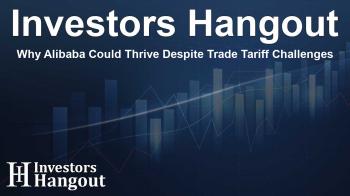Why Alibaba Could Thrive Despite Trade Tariff Challenges

Understanding Trade Tariffs and Their Impact
In recent times, the stock market has experienced fluctuations, largely influenced by trade tariffs introduced by governmental actions. These tariffs have sparked uncertainty across various sectors, particularly affecting companies with weaker earnings. However, a pressing question arises regarding the impact of these tariffs on overseas stocks, particularly those rooted in Asia.
Historically, tariffs have reshaped trade dynamics, notably impacting the trade volume between China and the United States. While these economic measures create challenges, certain businesses are better equipped to navigate the storm. This is especially true for major players like Alibaba Group, known for their extensive international operations.
Alibaba's Strategic Position in the Market
Although Alibaba stock has recently made strides, recovering approximately 85% of its prior high, it still trails behind prominent American stocks such as Alphabet and Amazon. Observations show that even following significant declines in U.S. tech stocks, many continue to hover near their highest values.
Importantly, Alibaba's peak stock value reached just above $300, and the current landscape suggests that it possesses a remarkable risk-to-reward ratio that has drawn the attention of some of Wall Street’s most respected investors. Notably, figures like Michael Burry and David Tepper have invested heavily in Alibaba, recognizing its potential amidst market fluctuations.
Resilience Against Tariff Effects
Alibaba operates a substantial portion of its business in the U.S., where consumers often turn to platforms like AliExpress for affordable products. Yet, the company’s reach extends beyond the U.S., encompassing major markets in Asia, the Middle East, Europe, and Latin America.
This geographical diversity provides Alibaba with a cushion against the impacts of tariffs, which may pose challenges for consumer spending but will ultimately constitute only a minor setback for the company's financial health. Beyond retail, Alibaba’s engagement in cloud computing showcases its adaptability in a rapidly changing economy.
Recent advancements by companies in the AI sector underscore the role that Alibaba could play in providing infrastructural support for AI developments. The firm has established numerous data centers across Asia, positioning itself as a significant player in capturing consumer insights comparable to those of its competitors.
Attractive Valuations for Investors
Currently, Alibaba’s forward price-to-earnings (P/E) ratio stands at an appealing 9.8x, markedly lower than the average P/E ratio of 23.4x for American companies. This disparity isn’t lost on savvy investors, illustrated by the recent reiteration of a Buy rating from analysts at Citigroup, predicting a target price of $138 per share. Such projections indicate a remarkable potential upside of over 37%, presenting a compelling investment opportunity amid tariff-induced market volatility.
The company's leadership is well aware of its undervaluation, as indicated by the announcement of a significant $25 billion stock buyback. This initiative signals to the market that insiders believe the stock is undervalued, reinforcing confidence in Alibaba’s future performance.
Overall, despite the looming presence of trade tariffs, the foundational strength of Alibaba’s business model, coupled with expansive market reach and attractive valuations, suggests that the company is well-positioned to thrive in the years ahead.
Frequently Asked Questions
1. What is Alibaba's current stock price trend?
Alibaba has seen its stock price recover approximately 85% of its previous high, indicating positive investor sentiment.
2. How do trade tariffs affect Alibaba's operations?
While tariffs may impact consumer behaviors, Alibaba's diverse international presence helps mitigate the overall effect on its financial performance.
3. Who are notable investors in Alibaba?
High-profile investors such as Michael Burry and David Tepper have made Alibaba a significant part of their portfolios, highlighting investor confidence.
4. What is Alibaba's competitive advantage in cloud computing?
Alibaba is investing heavily in cloud computing, positioning itself effectively within Asia's growing tech landscape by leveraging its extensive data centers.
5. Are analysts bullish on Alibaba's future stock price?
Yes, analysts predict a substantial upside for Alibaba, with a target price of $138 reflecting strong growth potential.
About The Author
Contact Dominic Sanders privately here. Or send an email with ATTN: Dominic Sanders as the subject to contact@investorshangout.com.
About Investors Hangout
Investors Hangout is a leading online stock forum for financial discussion and learning, offering a wide range of free tools and resources. It draws in traders of all levels, who exchange market knowledge, investigate trading tactics, and keep an eye on industry developments in real time. Featuring financial articles, stock message boards, quotes, charts, company profiles, and live news updates. Through cooperative learning and a wealth of informational resources, it helps users from novices creating their first portfolios to experts honing their techniques. Join Investors Hangout today: https://investorshangout.com/
The content of this article is based on factual, publicly available information and does not represent legal, financial, or investment advice. Investors Hangout does not offer financial advice, and the author is not a licensed financial advisor. Consult a qualified advisor before making any financial or investment decisions based on this article. This article should not be considered advice to purchase, sell, or hold any securities or other investments. If any of the material provided here is inaccurate, please contact us for corrections.

